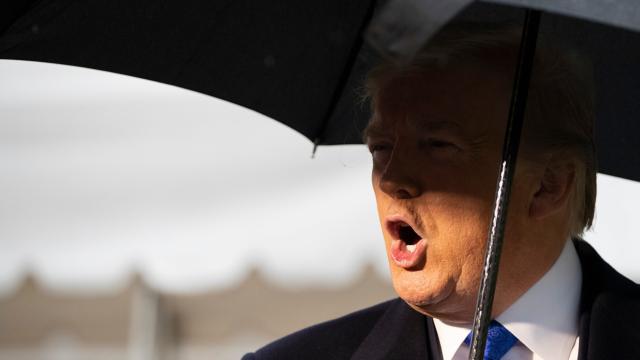Donald Trump clearly doesn’t watch CBS, because if he did, he’d be standing on a tarmac in front of a chopper, screaming about yesterday’s 60 Minutes report. For an interview with YouTube CEO Susan Wojcicki, the program found that Google and YouTube collected the Trump campaign’s money for more than 300 video ads before removing them days later. The evidence can be found in Google’s public database of political ads, a nutty and grim space that Michael Bloomberg is currently carpet bombing. Together, the Trump Make America Great Again Committee and Donald J. Trump for President, Inc. have spent over $US12.7 ($19) million on Google and YouTube ads.
Google doesn’t explain why it took down the ads, but perhaps it had something to do with its stated policy of prohibiting ads that espouse false claims, whether political or not.
So, the countdown to a fresh tantrum we’ll probably be hearing throughout the next year. A quick Twitter check reveals that Trump is currently thinking about the impeachment inquiry.
This comes a few weeks after the news that Google will be updating its political ad policy to forbid ad targeting based on any factors aside from age, gender, and location, which would prevent political campaigns from filtering their audience by voting records and party membership.
When Google announced that policy last month, Trump’s campaign manager Brad Parscale accused “Political elites & Big Tech” of trying to “rig elections” and “targeting Trump.” Democrats weren’t too thrilled about the change, either. Tara McGowan, founder of the new U.S. Democratic super PAC Acronym, texted the New York Times that the change is “outrageous” and “will hinder campaigns and (others) who are already working against the tide against bad actors to reach voters with facts.”
Google’s targeting policy officially goes into effect in January 2020, but unfortunately, Bloomberg has already noticed a workaround. While Google controls ad buys for YouTube and Search, Bloomberg notes, third-party ad tech companies like Trade Desk, Adobe, and MediaMath can still bid on display ads (the ones that pop up on sidebars and mastheads of sites). And they could target them as they will, if they like.
This leaves political ad policies up to a ton of other companies with varying policies. Trade Desk, for one, tells Gizmodo that they impose audience minimums, and therefore, political ads “cannot target very small audience segments.” An Adobe spokesperson tells Bloomberg that advertisers can use their own data for specific targeting. Media Maths declined to comment to Bloomberg and was not immediately available for comment to Gizmodo.
While Twitter has mercifully decided to wipe political ads altogether, political actors have gotten a jump on trolling. Ahead of this month’s U.K. general election, Tories reportedly set up a fake “fact-checking” Twitter account to prop up Boris Johnson during a recent debate.
Politicians are still free to baldly lie and microtarget voters for another election cycle anyway in the lawless waste of Facebook.
Gizmodo has reached out to Google and will update the post if we hear back.
